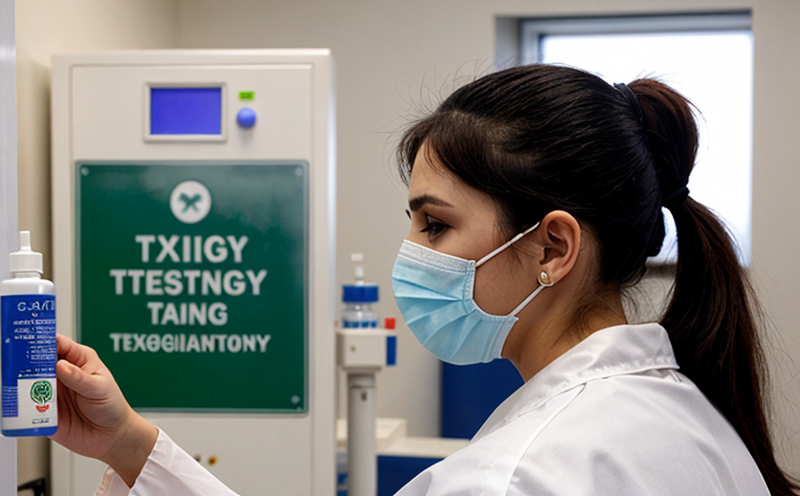Immunotoxicity T Cell Proliferation Testing
The Immunotoxicity T Cell Proliferation Test is a critical component in the evaluation of potential adverse effects that pharmaceutical compounds may have on the immune system. This test is particularly important for ensuring that new drugs and formulations do not compromise essential immune functions, which could lead to reduced efficacy or increased susceptibility to infections.
In this test, we assess how a substance affects T cells, a crucial part of the adaptive immune response. The proliferation of T cells is measured following in vitro exposure to the test substance under defined conditions. This allows us to identify any potential immunosuppressive effects that could impact the effectiveness or safety profile of a drug.
Our laboratory adheres strictly to international standards, including ISO and ASTM guidelines, ensuring reliable and reproducible results. The methodology is designed to be robust yet flexible enough to accommodate various test substance characteristics and formulations.
The importance of this testing cannot be overstated, especially in the pharmaceutical sector where safety and efficacy are paramount. By conducting thorough immunotoxicity assessments early in the drug development process, we can mitigate risks and ensure that only safe compounds proceed further into clinical trials and market release.
| Parameter | Description |
|---|---|
| In Vitro Exposure | The test substance is exposed to T cells in a controlled environment. |
| Assay Endpoint | The proliferation of T cells is measured as the primary endpoint. |
| Sample Preparation | T cells are isolated and cultured under specific conditions before exposure to the test substance. |
| Instrumentation Used | Luminometer or flow cytometer for quantification of T cell proliferation. |
The data generated from this test helps pharmaceutical companies make informed decisions about the safety and efficacy of their products. By identifying potential immunotoxic effects early on, we contribute significantly to reducing development risks and ensuring product quality.
This testing is particularly relevant in the context of biopharmaceuticals and novel drug delivery systems where the interaction between the substance and immune cells can be complex. Our comprehensive approach ensures that all aspects are considered, providing a robust foundation for regulatory submissions and market approval.
Scope and Methodology
The scope of the Immunotoxicity T Cell Proliferation Test involves the evaluation of potential adverse effects on T cell function. This is achieved through a series of carefully designed steps aimed at capturing any changes in T cell proliferation following exposure to the test substance.
| Step | Description |
|---|---|
| Sample Preparation | T cells are isolated from donor samples and cultured under defined conditions. |
| Exposure to Substance | The T cell culture is exposed to the test substance for a specified duration. |
| Proliferation Assay | A proliferative assay is conducted post-exposure using either a luminescence or flow cytometry method. |
| Data Analysis | The proliferation rate of T cells is compared to control groups to determine any significant changes. |
The methodology ensures that all parameters are controlled and standardized, providing consistent results across multiple batches. This approach not only enhances the reliability of our testing but also facilitates easier comparison with previous studies or data from other laboratories.
Our laboratory follows stringent protocols to ensure accurate and reliable outcomes. By adhering to these guidelines, we can provide clients with confidence in the safety profile of their products during development and production phases.
Why Choose This Test
The Immunotoxicity T Cell Proliferation Testing is essential for ensuring that pharmaceutical compounds do not interfere with critical immune functions. This test is particularly valuable in the following scenarios:
- New Drug Development: Identifying potential immunosuppressive effects early can prevent costly delays and failures later.
- Biopharmaceuticals: Ensuring that complex formulations do not disrupt T cell function is crucial for product efficacy.
- Clinical Trials: Demonstrating the safety profile of a drug to regulatory bodies requires robust immunotoxicity data.
- Regulatory Compliance: Meeting international standards such as ISO and ASTM ensures compliance with global regulatory requirements.
The test offers several advantages, including early risk identification, improved product quality, and enhanced safety profiles. By incorporating this testing into the development process, pharmaceutical companies can minimize risks and ensure that only safe compounds proceed to clinical trials.
Our laboratory's commitment to accuracy and reliability ensures that clients receive high-quality results that are trusted by regulatory bodies worldwide. This enhances confidence in the products being developed and increases the likelihood of successful market approval.
Customer Impact and Satisfaction
The Immunotoxicity T Cell Proliferation Testing plays a pivotal role in enhancing customer satisfaction by ensuring that pharmaceutical compounds are safe and effective. Here’s how this testing impacts our customers:
- Risk Mitigation: Identifying potential immunotoxic effects early helps mitigate risks associated with product development.
- Quality Assurance: By adhering to strict protocols, we ensure that only high-quality products reach the market.
- Compliance: Meeting international standards guarantees compliance with regulatory requirements, facilitating smoother market entry processes.
- Trustworthiness: Reliable and accurate testing results enhance customer trust in our services and the overall product quality.
The positive impact of this testing extends beyond just the development phase. By ensuring that products are safe from immunotoxic effects, we contribute to the overall well-being of patients using these medications. This aligns with our mission to provide comprehensive and reliable laboratory solutions that meet the highest standards of quality and safety.





